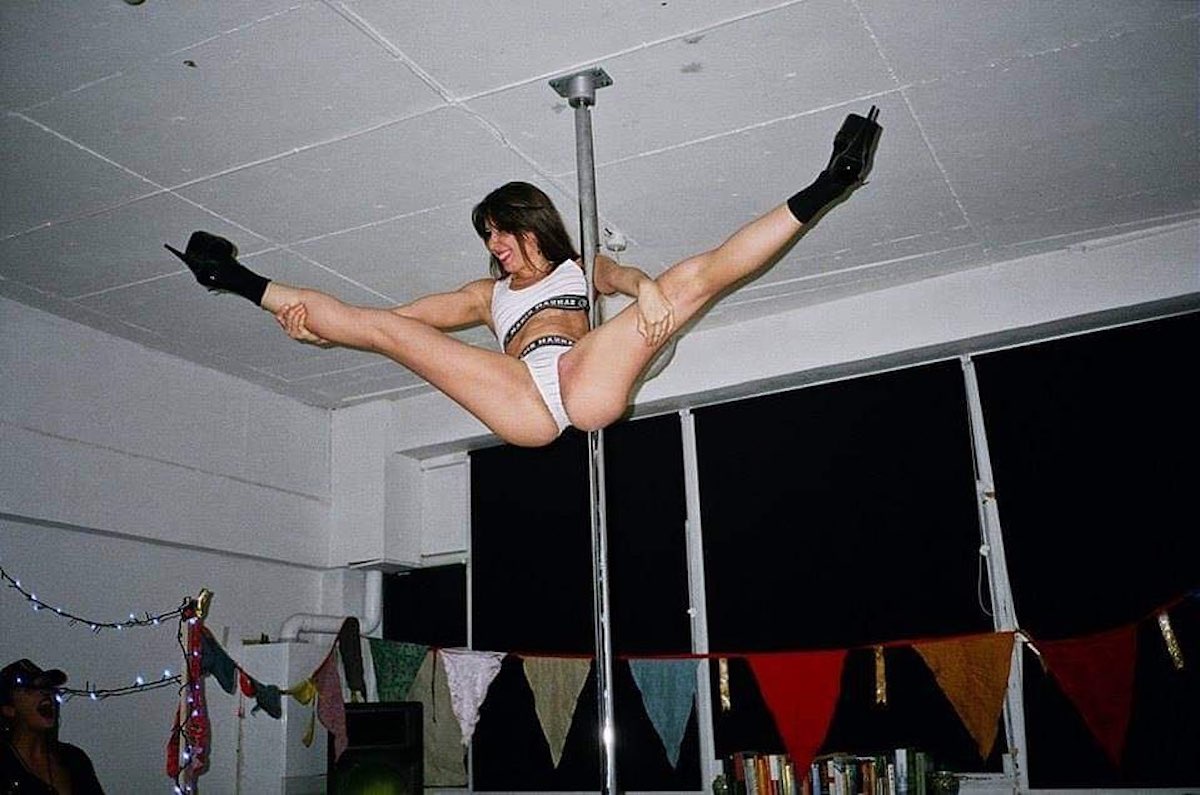I pose the question to my housemate as I wander into my kitchen naked. She’s…
Sex Work and the COVID 19 Pandemic
An interview with Chiqui Love and Dasa Hink about sex work, the impact of Corona and destigimatising and legitimising sex work.2 March 2021
Meet Dasa Hink (@Dasa_hink), a multidisciplinary artist and professional dominatrix, and Chiqui Love (@chiquilovelovelove), an erotic performer with over eighteen years of experience working in a variety of venues such as strips clubs, fetish clubs, festivals, and cabarets. In response to the poor working conditions often found in the industry, as well as seeing the potential, and need, to ignite a sex worker revolution, Chiqui also helped create the both East London and Berlin Strippers Collective.
To compliment the upcoming YEOJA + Transmodernity workshop that Dasa and Chiqui are holding on 06.03.21, YEOJA Mag sat down with these two powerful womxn to talk about sex work, the impact of Corona regulations and lockdowns for the sex work industry as well as their ongoing fight to de-stigimatise and legitimise sex work. Click here to sign up for the talk!

Hey Chiqui and Dasa! Could you introduce yourselves and your work to the YEOJA community?
Dasa: Hey there! I’m a multi-disciplinary artist, musician, and dominatrix living in Berlin. I’ve been a sex worker for seven years now, and am getting more and more interested in topics related to sexuallity; which I find a truly fascinating part of being human. In the last few years I’ve worked with video art and costume design, primarily made from Latex. Since Corona hit, I’ve been writing more songs and started rapping about my work as a dominatrix. My latest project is my YouTube channel, Dasa Hink, where I answer common questions about my job, as well as post my music videos and other experimental projects.
Chiqui: I am one of the founding members for both the East London and Berlin Strippers collective. Both of which were born out of the necessity to share the art of striptease to a wider crowd; by putting on our own events, we also created fairer working conditions.
We normally host life drawing events, cabaret shows, immersive performances, and very soon we will even have our own book club. By taking ownership of own narrative we are also seeking to destigmatise the type of person who works in the sex industry.

How did you get into what you do? How much is pure necessity vs. creativity?
Dasa: Getting into professional domination was at first a financial solution to the classic “poor artist” state I was in. But I definitely came into it with a lot of curiosity and a kind of rebellious joy.
Creativity is an integral part of being an independent dominatrix. I have to write texts, style myself, and organise photoshoots. Sessions can also become very intellectually stimulating and creative as well. It’s a bit like playing barbie with myself!
Chiqui: I guess a mix of both but a higher percentage would be given to necessity. I’ve always felt the most free on the stage and from a very young age I had a huge interest in becoming different characters as I was an extremely shy kid — except when I was performing. After trying waitressing, which I hated and was terrible at, and other bar jobs, stripping felt the most natural as I just love being on stage.
View this post on Instagram
What is the one thing you wish you weren’t asked all the time?
Chiqui: How much money do you make? Or messages like ‘I want to be a stripper but I don’t want to get naked or talk to guys’. I’m like, what? Stripping is a job, and sometimes, as in any other job, you have to do the not so fun bits too. If you want to make money from it, you will have to babysit grown men.
Dasa: Mine would be, ‘aren’t you scared at work?’. It’s a natural question to ask, but the fact that people ask it so often, is proof of how well spread the misconceptions about our trade are, and how sex workers are seen as victims and our clients as bad people. What they don’t know is that my clients are normal, functioning members of society. It’s very likely that most of us have a close person in our lives who has used a sexual service at some point.
As my experience tells me, the less stigmatised and more legal sex work becomes, the more we can organise with colleagues and speak openly about our job in the sex industry, which in turn leads to our protection. This makes us less vulnerable to violence and manipulation, which is a form of abuse that’s much more common in our trade than actual physical harm.
Chiqui, why did you form a collective? What was missing in the industry that made you want to take matters into your own hands?
Chiqui: The industry is very much about the male gaze, which makes sense as they have the money and pretty much dictate everything. So in return, we have a very heteronormative approach where creativity is limited. Also, most managers see strippers as walking cash cows and give almost no thought to our wellbeing, even though the job is extremely mentally demanding and we are the ones giving them pretty much all the revenue. Other factors were lack of safety in the workplace and unfair fines for things such as cancelling your shift because you were sick. The list goes on and on.

How has this collective protected you legally as well as in terms of sisterhood?
Chiqui: For myself, it hasn’t protected me legally yet. In London however, some strippers took club owners to court for unfair dismissal and won.
In terms of sisterhood, it has provided an incredible support group. As with most sex workers, it is tough to have friends and family that fully support you and that you can confide in without fear of judgement or having to edit yourself. It’s also been extremely creative as we always bounce off each other’s ideas and get inspired by each other’s work and journeys.
What alternative ways have you created to protect yourself from the lousy working conditions and owning what you do as a sex worker, in your case, Dasa and for you Chiqui, within the strippers collective?
Chiqui: Unfortunately, there isn’t so much we can do when we are working at the club apart from trying to work together and support each other. At the end of the day venue owners and managers will impose their rules and if you don’t like them you are out.
But by creating our own jobs, we are generating alternative ways of revenue away from such spaces.
Dasa: I have been so lucky to be a part of StudioLux in Berlin, which is much more than a place of work. It’s run by colleagues Johanna Weber, Lady Velvet Steel, and Emma Steel, who make sure we don’t just have a very high quality play space, but most importantly amazing work conditions and a strong sense of community. We get together to support and share with each other, as well as for sex work activism. Being a part of this wonderful work place is what makes me able to speak so openly about what I do. I feel supported and understood by my peers. Community is so important.

What is happening now for strippers and sex workers? What are the alternative routes for strippers and sex workers to continue making a living with their services/art during the pandemic?
Chiqui: A lot of sex workers have moved online. Some had access to government help but not many, and some had to keep on working because it is either that or not eating and paying rent. The fact that laws are being put into place to make it harder to work during these times, means that it’s also harder to screen potential unsafe clients and that lack of work also means lowering rates and overstepping boundaries to make a living.
Moving online also requires a certain level of privilege, as you need the equipment; enough time to make content and interact; a place to make content; and knowledge of how to best use this technology to your favour.
Dasa: I have been offering online sessions but these are just for a bit of fun and don’t really pay my bills. I can’t charge my regular rates and don’t have access to online payment options, because sex workers are banned from those. Advertising on socials will put me at risk of being deleted or shadow banned. Even if my Youtube channel gets lots of views I’m not allowed to get ad revenue. Censorship online is a real problem. OnlyFans is an option for some, but you can get shadow banned for advertising it.

What should we be doing to destigmatize sex work?
Chiqui: Firstly, advocate for decriminalisation. Reducing stigma requires not only legal and policy change, but cultural change. We need to involve sex workers in conversations regarding workers’ rights and policy making. To see the value of sex work as a legitimate work that consenting adults might want to engage in, for a million different reasons. Lots of sex work is therapy. I would love to, for example, be able to rent an apartment without having to edit what I do for a living because of fear of being dismissed as a not suitable tenant.
Giving us a platform to speak out like YEOJA is doing right now. The vast majority of people have never heard from a sex worker who chose their job and are struggling under the same laws that are supposed to protect us. There needs to be a drastic change in thinking, not just in Berlin, but in more religious and puritan societies as well. For example the SESTA FOSTA law which causes a lot of discrimination online is an American law. But we ALL suffer from it. Amnesty international is supporting the decriminalisation of the sex trade, but governments and public opinions are lagging behind, staying fixated on old fashioned morality and empty statements.

Dasa, in terms of sex work could you talk a little more about being your own boss, as well as your legal rights? What is it like working on your own rather than working with an intermediary? How do you build up clients? Lastly, how protected are you, especially when it concerns under the table work and taxes?
Dasa: I have always been completely independant just like any other freelancer. I’ve worked in different brothels and BDSM studios under good and bad working conditions. I could always refuse clients, choose my own schedule, and most of the time I chose my own rate. In Germany prostitution is legalised, which means there are a lot of regulations, but as a foreigner with a work visa, and as a registered sex worker, I am allowed to work. It is my responsibility to file taxes just like any other freelancer. It might sound weird but I’m happy and proud to pay taxes. It makes me into a completely normal citizen of this country and for that reason I could also receive financial aid during Corona, because I’ve been paying proper taxes all these years. There are of course many of us who are for example migrant sex workers, without the right paperwork, and they are much more vulnerable to being exploited or having to work under bad conditions.
Has there been government support for sex workers/strippers during the pandemic? What is the legal situation in Berlin and London right now?
Dasa: In Germany the financial aid has been good for those who are registered and have all the right paperwork but there are many who fall through the gaps of social support. My colleagues at Studio Lux and at BesD have collected funds through different projects and donations to help those who can’t get any funding.
Chiqui: Stripping [in general] is a grey area that is considered performance, so many of us are registered as freelancers and dancers, which has made it easier to get some funds. However, this hasn’t been the case for many and the lack of proper invoicing from the clubs or contracts or any sort of health insurance or proof of work has made it hard to access other types of help. Also let’s remember that many in this industry are migrants without proper paperwork.
There have been great initiatives from other sex worker led organisations and night time workers such as Berlin Collective Action. East London Strippers Collective is using their online life drawing sessions funds to give away grants to strippers who are financially struggling and as Dasa mentions, BesD is also giving away emergency funds to sex workers.

Lastly, as a message of encouragement to other strippers or sex workers, what can we all do to support and give rise to a culture that is supportive, respectful and safe?
Dasa: Attitudes towards sex workers are improving so quickly, and I think it’s just a matter of time until we embrace sex workers as knowledgable skilled workers, as people who can help others, and as people just like anyone else who are doing what they can. [To help], you can become more sex [worker] positive, more feminist, more open to the others, and more empathetic.
There’s still so much work to do, because sexuality is such a long held taboo and there’s so much confusion and trauma in our past. But knowing my colleagues I can tell you, sex workers are tough, smart, and so cool! We’re finding ways to change the debate all the time and if we keep pushing I believe there will be positive change.
Chiqui: Pay for your adult content. As an example, we have a Patreon page you can subscribe to for a very modest amount, and we also host occasional online shows, check our Instagram page for more info.
As well as that, support the decriminalisation of sex work, share content that has relevant information about it, share our posts as we get shadow banned constantly, follow our pages, and get involved by helping us amplify our message.
_
Images provided by Chiqui Love and Dasa Hink. To follow Chiqui Love on Instagram, click here. To follow Dasa Hink on Instagram, click here. For more articles on sex work, click here.








